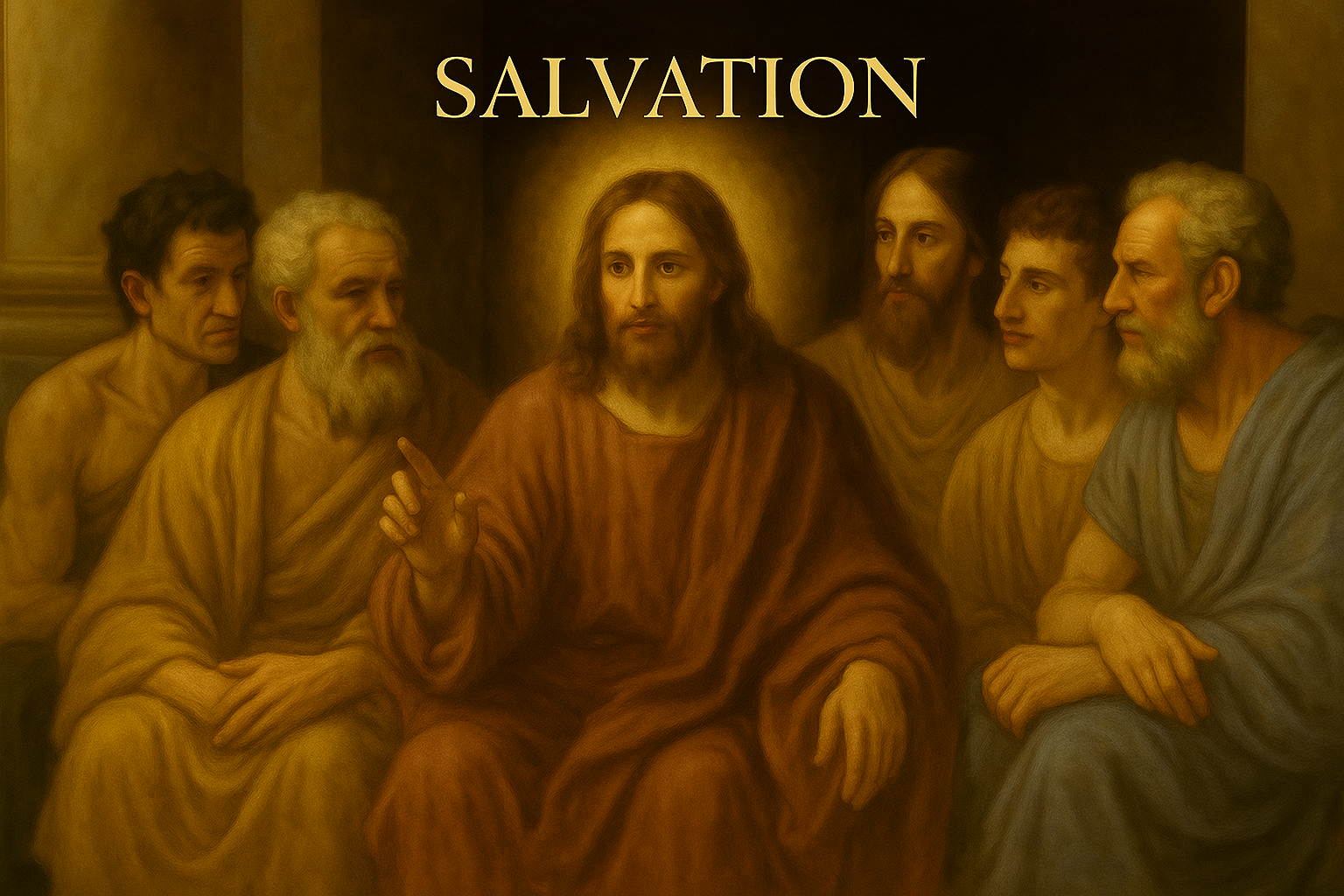Jesus sat on the mount, exhausted. Not from the sermon. From the meeting afterward.
“Master,” Peter said, pulling out a scroll. “We’ve been working on the messaging framework for your teachings. Want to see the value proposition?”
Jesus closed his eyes. “Peter. We’ve talked about this.”
“Right, right. I know. But look, we’ve got the features mapped out: healing, miracles, eternal life. And the benefits: hope, community, transformation. Plus, we’re positioning you as ‘the way, the truth, and the life.’ Great tagline, right?”
“That’s not positioning, Peter. That’s what I am.”
Matthew jumped in, excited. “But Jesus, we did the competitor analysis! The Pharisees’ value prop is ‘we preserve sacred tradition and ensure proper worship.’ The Romans say, ‘We bring order and civilization to the world.’ So we thought, what if our value prop is ‘we offer love and redemption through grace’? Totally different, right?”
Jesus stopped him. “Wait. Stop. What did you just say the Pharisees and Romans offer?”
“Well, the Pharisees offer tradition and proper worship. The Romans offer order and…”
“No, Matthew. That’s what they SAY. That’s their messaging. What do they actually OWN in people’s minds?”
Confused silence.
Jesus continued. “When someone thinks ‘religious authority,’ who comes to mind?”
“The Pharisees,” John said.
“When someone thinks ‘power’ or ’empire’?”
“The Romans,” Andrew answered.
“Exactly. The Pharisees don’t own ‘tradition,’ that’s their value proposition. They own religious authority. The Romans don’t own ‘order,’ that’s their tagline. They own empire.”
He looked at them. “You’re describing what they claim to offer. Not what mental territory they actually occupy. You’re doing the same thing with me, listing features and benefits instead of identifying the concept I own.”
Peter scratched his head. “But… isn’t that the same thing?”
“No! And that’s the whole problem!” Jesus drew in the sand. “Look:”
What they SAY vs. What they OWN:
PHARISEES
SAY: “We preserve tradition and ensure proper worship” (value prop)
OWN: Religious authority (mental territory)
ROMANS
SAY: “We bring order and civilization” (value prop)
OWN: Empire/Power (mental territory)
“See the difference? Their messaging describes what they do. But what they OWN in minds is the deeper concept. And you’re making the same mistake with me — describing what I do instead of what concept we should own.”
Thomas raised his hand. “So what should we own?”
“Salvation,” Jesus said. “Not as a feature. As THE concept. The idea that humanity can be redeemed. That’s the mental territory. Everything else flows FROM that.”
Peter scribbled furiously. “Okay, okay. So… ‘Salvation’ is our unique selling proposition?”
“No! It’s not a proposition! It’s what we are!” Jesus took a breath. “Listen. Here’s how this actually works:”
He drew in the sand:
POSITION: Salvation (the noun we own)
↓
METHODOLOGY: The Gospel (how we deliver salvation)
↓
FRAMEWORKS: The teachings, commandments, parables (structures that organize the methodology)
↓
COMMUNICATION: Sermons, miracles, stories (how we express the frameworks)
“See?” Jesus pointed. “The position comes first. Salvation. That’s the mental territory we own. From that comes the methodology: the Gospel, the path to salvation. From the methodology come the frameworks: the Beatitudes, the commandments, the parables that help people follow the path. And THEN comes communication. The sermons, the miracles that demonstrate it all.”
Philip squinted at the sand. “So… the Sermon on the Mount is communication?”
“Yes! It communicates the frameworks, which express the methodology, which delivers on the position.”
“And the miracles?”
“Proof. Evidence that the position is real.”
Matthew looked at his scroll. “But Jesus, we listed all these value propositions for the competitors. We thought that’s how you find your positioning, by seeing what everyone else offers.”
“That’s the trap!” Jesus stood up. “You’re comparing value propositions. Descriptions. What people SAY they do. Real positioning is about what concepts people OWN in minds, often completely different from their messaging.”
“The Pharisees write scrolls about tradition, but what they actually own is religious authority. The Romans talk about civilization, but what they actually own is power. If you only look at their value props, you miss what they truly control.”
John raised his hand. “So how do we know what someone actually owns versus what they claim?”
“Ask yourself: when someone has a problem, whose name comes to mind? When someone needs religious guidance, they think ‘Pharisees,’ not because of the value prop about tradition, but because the Pharisees own religious authority in their minds. When someone needs protection or fears invasion, they think ‘Romans,’ not because of civilization messaging, but because Romans own power.”
He turned to them. “And when someone asks, ‘How am I saved?’ we want the answer that forms in their mind to be us. Not because we have better value props than the Pharisees. But because we own salvation itself.”
Judas raised his hand. “But don’t we need to differentiate our value proposition from…” “JUDAS.” Jesus closed his eyes. “Value propositions are level four. They’re communication. They only matter if you first own mental territory.”
He drew again:
POSITION: What noun you own (Salvation)
METHODOLOGY: How you deliver it (The Gospel)
FRAMEWORKS: The structures (Commandments, Beatitudes)
COMMUNICATION: How you express it (Value props, sermons, miracles)
“The Pharisees skipped level one. They have frameworks, hundreds of rules. They have communication, synagogues, scrolls, and rituals. But what they OWN is religious authority, and they never chose that strategically. It just happened. Same with Romans, they didn’t choose to own empire. They just built one, and the mental territory followed.”
“We have the chance to choose. To intentionally own salvation. Then build methodology, frameworks, and communication that prove we own it.”
Andrew spoke up. “So when we analyzed competitors’ value props…” “You analyzed their communication. Level four. Not their positioning. Level one.”
Matthew looked defeated. “So all this work…”
“Is useful,” Jesus said gently. “But it’s backwards. You compared what they SAY, not what they OWN. Real competitive analysis asks: what mental territory does each competitor occupy? What concept, when thought about, brings them to mind?”
“The Pharisees own religious authority. We won’t fight them there. The Romans own power. We won’t fight them there either. But salvation? That’s unclaimed mental territory. That’s what we take.”
Philip raised his hand. “Master, I think I understand now! So we should start working on the homepage, right? Get the messaging on the website? Maybe update our LinkedIn profiles to talk about salvation?”
Jesus put his face in his hands.
Long silence.
“Philip,” Jesus said slowly, looking up. “How do you think you own a concept in people’s minds?”
“Well… we tell them about it? On our homepage? In our bios?”
Peter jumped in, excited. “Yeah! We could have a header that says ‘We Own Salvation’ and then three bullet points explaining…”
“STOP.”
Jesus stood up. “You don’t own mental territory through WEBSITES. You don’t claim concepts through LINKEDIN PROFILES.”
He paced. “How did the Pharisees come to own religious authority? Did they put it on a homepage?”
“No,” John said quietly. “They… built synagogues. Trained rabbis. Made rulings on every aspect of religious life. Enforced their interpretations.”
“Exactly! They BECAME religious authority through actions, through commitments, through decisions over decades. The mental territory followed the reality.”
“How did Rome own empire? Through website copy?”
Thomas shook his head. “They conquered. Built roads. Established laws. Created systems of governance. Made it impossible to think of power without thinking of Rome.”
“YES!” Jesus pointed at him. “They built organizational architecture that PROVED they owned empire. The mental territory came from the reality they created.”
He turned to Philip. “So when you ask about the homepage, you’re trying to CLAIM ownership through words. But you own mental territory through BEING it. Through actions so consistent, so committed, that people can’t separate the concept from you.”
Matthew raised his hand tentatively. “So… we need to prove we own salvation first?”
“Not just prove it, Matthew. BECOME it. Make decisions that only make sense if salvation is what we are. Invest in things that seem crazy unless salvation is our core. Sacrifice things that contradict owning salvation.”
He drew in the sand again:
How You DON’T Own Mental Territory:
- Update homepage
- Write LinkedIn posts
- Create messaging framework
- Launch rebrand campaign
How You DO Own Mental Territory:
- Make costly commitments aligned with your position
- Build organizational architecture around the concept
- Sacrifice opportunities that contradict the position
- Create proof so undeniable people can’t separate you from the concept
“The homepage comes AFTER you’ve become it. The LinkedIn profile comes AFTER you own it. Communication is the LAST step, not the first.”
Andrew looked confused. “But Master, how will people know we own salvation if we don’t tell them?”
“They’ll know because EVERYTHING YOU DO screams it. When I heal on the Sabbath (choosing salvation over religious rules), when I eat with tax collectors, that proves salvation is for everyone. When I wash your feet, that’s showing salvation requires humility and service.”
“THOSE actions create the mental territory. Not a homepage headline.”
Philip pulled out another scroll. “But we still need a website eventually, right? I mean, the Pharisees have…”
Jesus grabbed the scroll and threw it. “The Pharisees have TEMPLES, Philip. Physical architecture that proves their position. The Romans have ROADS and LEGIONS — infrastructure that makes their position inevitable.”
“What do we have? Are we building organizational proof? Are we making commitments that cost us something? Are we structuring everything around salvation in a way that’s impossible to fake?”
Silence.
“Because if you’re not doing that (if you’re just writing better homepage copy), you’re not building a position. You’re writing marketing.”
Judas raised his hand. “So… no website at all?”
Jesus sat down, exhausted. “You can have a website, Judas, AFTER you’ve built something worth talking about. After you’ve made decisions that prove you own salvation. After your actions have created mental territory that’s undeniable.”
“The Pharisees didn’t start with ‘Our value proposition is religious authority.’ They BECAME religious authority. Then people described them that way.”
“Rome didn’t launch with ‘We own empire’ on their homepage. They BUILT an empire. Then people couldn’t think of power without thinking of Rome.”
“We don’t START with the homepage. We start by becoming what we want to own. The communication follows.”
Peter looked at his scroll, then at Jesus. “So… all this messaging work we did…”
“Is level four. Communication. You skipped levels one, two, and three. You haven’t chosen what to own, built a methodology to deliver it, or created frameworks to organize it. You just jumped straight to ‘what should the homepage say.’”
“That’s why every individual and business struggles with messaging. They’re trying to communicate a position they haven’t built.”
Matthew spoke quietly. “How do we build it then?”
Jesus stood. “You start making decisions that only make sense if salvation is your core. You invest in proving it. You sacrifice things that contradict it. You build organizational architecture (people, products, processes, priorities) that make salvation inevitable.”
“THEN (after months, years of that), you might be ready for a homepage. Because by then, the homepage will describe what’s obviously true. What everyone already associates with you.”
Philip raised his hand one more time. “But Master, our competitors have websites NOW. Don’t we need to…”
Jesus picked up his robes.
“Where are you going?” Peter asked.
“To the desert. For 40 days. To fast and pray and contemplate how I’m going to explain this for the NEXT 2,000 years.”
“But we haven’t finished the LinkedIn strategy!” Andrew called.
Jesus stopped. Turned around. Looked at them with infinite patience and infinite exhaustion.
“You want to own salvation through a LinkedIn post?”
“Well… we could do a carousel about the resurrection and…”
Jesus walked away.
From a distance, they heard: “POSITION THROUGH ACTION, NOT COMMUNICATION. BUILD THE REALITY FIRST. THE HOMEPAGE COMES LAST.”
And then, very faintly: “Nobody owns mental territory through website copy…”
MORAL OF THE STORY:
Even Jesus couldn’t get his disciples to stop jumping to tactics before strategy.
What doesn’t create positioning:
- Homepage copy
- LinkedIn profiles
- Messaging frameworks
- Website redesigns
- Social media posts
What does create positioning:
- Decisions that cost something
- Organizational architecture aligned with your position
- Sacrifices that prove commitment
- Actions so consistent they become undeniable
- Building reality that makes the position inevitable
The disciples wanted to CLAIM salvation through words.
Jesus wanted to BECOME salvation through actions.
One approach gets you website copy.
The other gets you 2,000 years of mental territory ownership.
THE TRUTH:
Christianity didn’t own salvation because of their homepage.
They owned it because of the resurrection. The persecution they endured. The martyrs. The organizational commitment to the concept across centuries.
The communication came after.
Same with every company that owns mental territory:
Volvo owns safety because they’ve made costly engineering decisions for 50 years, not because their website says “safety.”
Tesla owns the future because they built Gigafactories and killed the dealership model, not because their LinkedIn says “innovation.”
Red Bull owns human performance because they sponsor cliff diving and space jumps, not because their homepage has good copy.
P.S. If you’re working on your homepage before you’ve made costly commitments aligned with your position, you’re the disciples asking about website copy while Jesus facepalms.
P.P.S. The disciples eventually figured it out. They stopped asking about messaging and started building churches. Died for their position. Created organizational architecture. Endured persecution. Made it impossible to separate Christianity from salvation through actions, not words.
Then — THEN — people wrote about it.
The Gospels came after the reality, not before.
P.P.P.S. Your homepage should describe what’s already undeniably true about your business, not try to create truth through claims.
Build the position through action.
The communication follows.
That’s how you own mental territory for millennia.
Not through messaging.
Uncover your position

Before you hire a messaging consultant to wordsmith your homepage, or an agency to “refresh your brand,” or someone to fix what they’ll call positioning (but is really just tactical framing), try this first.
The CEO Clarity Starter Kit
It does exactly what we just read. It helps you find and own your noun.
What you do:
- Run the Position Audit (reveals what noun you might already own without knowing it)
- Complete the 8-Question Advisor (the same questions that would surface “Command” for Cluely)
- Feed the output into ClarityGPT (included)
What you get:
- Your noun. The concept you can actually own, not just claim
- A 4-Level Positioning Canvas showing how to move from saying it to OWNING it
- ClarityGPT translates your position into landing pages, offers, and LinkedIn profiles (written in your buyer’s voice, not consultant-speak)
- A 30-day positioning course so you can apply this method without me
Time required: About an hour (less time than reading three more case studies about tactics that won’t work without position)
Who’s used it: 200+ CEOs and founders who were tired of pushing uphill
Investment: $249 USD
Most realize they don’t need the consultant or agency after this. Or they need far less than they thought. Because once you know your noun (your position), the tactics become obvious. The distribution chooses itself. The customers explain you better than you explain yourself.
And yes, if you buy the kit, it nudges me closer to that Porsche in the photo. Thanks in advance for supporting excellent positioning and questionable life choices.

Stop competing on features. Start owning concepts.




Leave a Reply
You must be logged in to post a comment.